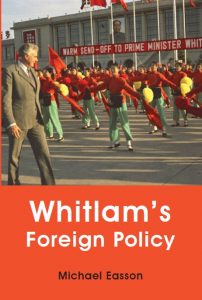Whitlam’s Foreign Policy - Book Launch
On Tuesday 2 May 2023, the Australian Institute of International Affairs NSW hosted the launch of Dr Michael Easson’s Whitlam’s Foreign Policy. Speaking at the launch were the Hon Richard Marles MP, Australia’s Defence Minister and Deputy Prime Minister, and the author himself, Dr Easson.
Mr Marles began by quoting Whitlam on foreign policy: ‘there is a tour of the great man’s thoughts and action in the space of foreign policy’. These words, according to Mr Marles, express how under Whitlam’s leadership Australia was moving in a new direction, in particular towards the region in which we are located. They also demonstrate the confidence that Australia carries as it presents itself to world in the future. Both of these, Mr Marles said, remain relevant as the Albanese government seeks to be a self-reliant country that seeks to understand the Asia-Pacific region. Australia’s lineage in foreign policy speaks to a country that is self-confident and understands its place within the world, as well as the importance of being an activist middle power. Mr Marles commended Dr Easson for dealing with more controversial aspects of Whitlam’s foreign policy (including relations with the US).
Mr Marles emphasised overall consistency of Whitlam’s foreign policy with the objectives of the current Labor government. Whitlam’s impact on foreign policy became a hallmark of his time as Prime Minister. His recognition of, and travel to, China formed a relationship which is one of the most important economic relations throughout Australian history. Whitlam was a forerunner; the world followed. Additionally, Whitlam understood the significance of our relationship with Indonesia and played a role in the independence of Papua New Guinea.
Dr Easson then took the stand to provide a brief outline of his motivations behind the book, and the highlights within it. Whitlam was no passing flash within Australian political history: he had long-lasting impacts on Australian foreign policy. Highlights included his numerous trips overseas, through which he created many new relationships and expanded Australians’ views on foreign policy. Secondly, Whitlam had an impact within the Labor Party itself, influencing how people projected their own views.
In discussion following these presentations, Dr Easson dealt with controversial decisions made by Whitlam. He described Whitlam’s 1974 recognition of the Soviet occupation of the Baltic States as economically and politically inexplicable, and as a colossal mistake. On East Timor, Dr Easson said he understood Whitlam’s belief that East Timor had no future as an independent country, but believes that Whitlam was on the wrong side of history and missed an opportunity to stand up for social democratic process.
Asked about Taiwan, Dr Easson noted that Whitlam argued for diplomatic relations between Australia and Taiwan, and he never acknowledged China’s right to Taiwan. Dr Easson suggested that no Australian government should support independence for Taiwan given the conflicts it would produce, but should instead support maintaining the status quo. Mr Marles also expressed support for the status quo: China remains a significant cornerstone in Australia’s world view and the current government seeks to stabilise the relationship. In response to a follow-up question regarding Taiwan and control over foreign military activities on Australian territory, Mr Marles emphasised that Australia has ultimate control.
Report by Ella Whitehurst, AIIA NSW intern
